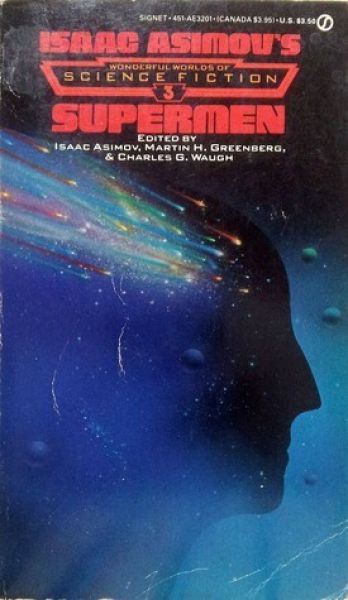Where Are All The Gods?
Supermen (Isaac Asimov’s Wonderful Worlds of Science Fiction, volume 3)
Edited by Isaac Asimov, Martin H. Greenberg & Charles G. Waugh

14 Oct, 2021
Isaac Asimov, Martin H. Greenberg, and Charles G. Waugh’s 1984 Supermen is the third volume in the Isaac Asimov’s Wonderful Worlds of Science Fiction anthology series.
My initial impression was that the editors took a pretty broad interpretation of “supermen.” A number of the protagonists aren’t so much superhuman as examples of what baseline humans can do with determination. In contrast, the editors used a narrower definition of the “man” part of superman. Almost all of the extraordinary protagonists are men, with women relegated to support roles or offered as prizes.
My second impression is that for a collection of stories about extraordinary people, the stories themselves are fairly standard. The perils of being widely read in the field, I suppose. One gets to be very familiar with the standard tropes and how they are used. For example, one would expect eugenics to make an appearance in stories about people with innate superiority and indeed it does.
This very familiarity led me astray. Aware of John W. Campbell, Jr’s fondness for tales about superhumans, I expected the anthology to be dominated by Astounding/Analog stories. Not so! Of the dozen stories included herein, only two were first published by Campbell. The editor whose taste most closely tracked that of the collection’s editors seems to have been Fred Pohl, whose various magazines provided four of the stories. Other editors who first published the stories are (in order), Robert P. Mills (two stories), Edward L. Ferman (two), John Carnell (one) and Ejler Jakobsson (one). Magazines represented here are If (three), The Magazine of Fantasy and Science Fiction (three), Astounding (two), Galaxy(two), New Worlds Science Fiction (one), and Venture Science Fiction Magazine (one).
I also failed to anticipate how many of these stories would be police procedurals of one sort or another. In these stories, the superhumans aren’t rebels; they’re much more likely to work for the Man (which shows some foresight on the part of the Man). Even the barbarian in the last story is eventually convinced to become part of the system he loathes.
Supermen is out of print.
Now for the stories:
Introduction: Super • (1984) • essay by Isaac Asimov
Asimov discourses briefly on what it means to be super.
“Angel, Dark Angel” • (1967) • short story by Roger Zelazny
Dispatched to deal with a seemingly invulnerable disruptive element, the government’s top agent is swayed by persuasive argument.
(Originally published in Galaxy, editor Fred Pohl)
“Worlds to Kill” • (1968) • novelette by Harlan Ellison
A genius puts his gift for conquering worlds to good use.
(Originally published in If, editor Fred Pohl)
“In the Bone” • (1966) • short story by Gordon R. Dickson
An overconfident astronaut is forced to fall back on more primitive abilities when a technologically superior alien captures him and strips the human of his protective machines.
This Humanity Uber Alles tale seems as if it would have been a good fit for Campbell’s Analog; it was in fact published in Pohl’s If. This was a very, very Gordon Dickson story.
What Rough Beast? • (1959) • novelette by Damon Knight
A well-meaning Russian immigrant tries to help those around him with his very special power. However, his knack’s limitations produce tragic results for those he helps.
(Originally published in The Magazine of Fantasy and Science Fiction, editor Robert P. Mills)
Death by Ecstasy • [Gil Hamilton] • (1969) • novella by Larry Niven
Convinced a friend’s apparent suicide was murder, a telekinetic UN cop unravels a most unpleasant organ-legging scheme.
(Originally published in Galaxy, editor Fred Pohl)
Un-Man • [Psychotechnic League] • (1953) • novella by Poul Anderson
A very special agent and his brothers-in-arms contend with a malevolent plot to restore militaristic nationalism and all the evils that spring from it.
(Originally published in Astounding, editor John Campbell, Jr.)
“Muse” • (1969) • short story by Dean R. Koontz
A talented musician makes the terrible error of visiting his blinkered, cruel family.
(Originally published in The Magazine of Fantasy and Science Fiction, editor Edward L. Ferman)
“Resurrection” • (1949) • short story by A. E. van Vogt
Curious about long-vanished humanity, aliens make the fatal error of resurrecting one.
(Originally published in Astounding, editor John W. Campbell, Jr.)
Pseudopath • (1959) • novelette by Philip E. High
A special agent’s gift for understanding could be mistaken for telepathy … but only by the uninformed.
(Originally published in New Worlds Science Fiction, editor John Carnell)
“After the Myths Went Home” • (1969) • short story by Robert Silverberg
This is a story by Robert Silverberg.
(Originally published in The Magazine of Fantasy and Science Fiction, edited by Edward L. Ferman)
Before the Talent Dies • (1957) • novelette by Henry Slesar
Aware the government has decreed his execution, a telepath sets out to ensure that his marvelous genes survive.
Which he does in a manner that explains why the government is convinced he needs to die.
(Originally published in Venture Science Fiction Magazine, edited by Robert P. Mills)
Brood World Barbarian • (1969) • novelette by Perry A. Chapdelaine
Kidnapped from his primitive world, an irate barbarian consigned to deadly combat in the arena seeks freedom. What he finds: illumination.
(Originally published in If, editor Ejler Jakobsson)
